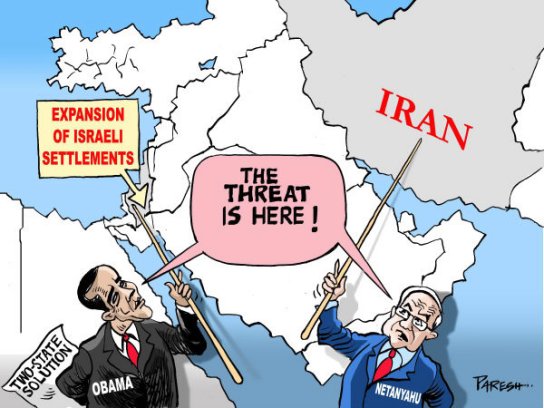
President Obama is nice to Israel’s Prime Minister Netanyahu and the disagreement over settlement expansion is put aside. But one thing is clear: the United States and Israel no longer pursue a common course.
They want to be friends again. After their big falling out, Americans and Israelis are now strengthening their alliance. Hillary Clinton promises the United States stands “rock-solid” at Israel’s side; President Obama invites Benjamin Netanyahu to chit-chat at the White House and at the end of the love-fest two things are evident: First, the disagreement over Israel’s settlement expansion policy in Arab East Jerusalem has been laid to rest, and second, their next fight will not be long in coming.
Behind all the declarations of friendship and guarantees of security, a chasm has opened in American-Israeli relations. On the fundamental issues — the Middle East peace process and the response to Iran’s nuclear program — the two allies are following divergent paths.Washington wants to see the founding of a Palestinian state within two years and a large measure of Obama’s foreign policy credibility depends on that success.
The Israeli government is in no rush to accomplish that and above all rejects the concessions it would have to make to do so, such as halting its settlement expansion program. On Iran, Obama remains committed to forging as broad an international coalition as possible to force Iran to come to terms through sanctions. In the background, Israel endangers this undoubtedly tedious process by threatening unilateral military action against Iran.
Washington made it abundantly clear that it feels Israel’s settlement policy is detrimental to the security of U.S. troops in Iraq and Afghanistan and that even America’s closest friend cannot expect to work against U.S. interests without feeling the pain of that decision.
The recent controversy over Israel’s decision to build 1,600 new housing units in Ramat Shlomo gave the Obama administration a welcome excuse to set down some limits for Netanyahu. Netanyahu, who fancies himself the greatest tactician this side of the Jordan River, got a real dressing down in diplomatic terms.
A barrage of accusations and demands came not only from the United States; the European Union and the United Nations also got into the act. Finally, even Angela Merkel, the chancellor considered Israel’s greatest friend, got involved. Obviously at Washington’s suggestion, she called Netanyahu and also read him the riot act. It can get no clearer than that. The only question remaining is whether the Israeli prime minister actually got the message.
Netanyahu had, in fact, unleashed a blizzard of concessions designed to facilitate the resumption of peace talks with the Palestinians before his departure for the United States. These ranged from loosening the blockade of Gaza to the release of Palestinian prisoners; it was the only way he could have gotten himself invited to the White House Tuesday evening. But the concessions ended at the basic issue of settlements and even on American soil he continued to insist that expansion all over the city of Jerusalem is sacrosanct to his government. Jerusalem, he said, was not a settlement; it was Israel’s capital city.
The bottom line is that Netanyahu is continuing the policies of every Israeli government of the last 40 years. The United States silently tolerated that with Netanyahu’s predecessor, Ehud Olmert. But Olmert, unlike Netanyahu, engaged in serious negotiations with the Palestinians.
The American government’s acquiescence in dropping the Jerusalem settlement expansion issue has a reason: they have made their point to Netanyahu and now want to look forward to starting indirect peace negotiations. Then we will see how far the friendship goes and Obama will see how much Netanyahu is prepared to do to maintain it.

Leave a Reply
You must be logged in to post a comment.